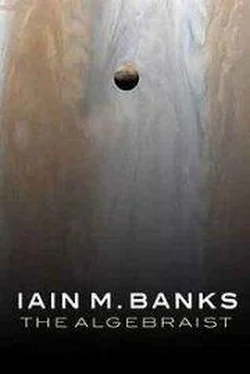“Mum, please sit down,” Jaal told her. Jaal’s mother, fashion-gaunt in the latest war-chic after decades of at the time equally fashionable Rubensism, sat down, squeezing easily between her husband and one of his sisters. All ten of them were crowded into a windowless basement room at the back of the lodge. This was reckoned to be the safest place in the house, just in case anything happened outside. If there was significant fighting in space around ’glantine, debris could fall anywhere.
Venn Hariage, the new Chief Seer of Sept Tonderon who had replaced the still-mourned Braam Ganscerel, had decreed that, especially as they represented the most senior Sept, and given the unfortunate fate of Sept Bantrabal, they could afford to lose no more of their people. They had broken the predictable sequence of processing round their seasonal Houses and left the usual stamping grounds of all the Septs far behind, retreating to the high hills bordering the Great Southern Plateau. In a war of the scale being threatened, there were no completely safe refuges, but here was significantly safer than most places. Only deep underground was much safer, and all those shelters were pretty much full of the military, the Omnocracy and the Administrata.
Some people and organisations had entrusted themselves to space, fleeing to small habitats and especially to little civilian ships, hoping to hide in the volumes of space throughout the inner system, though the official line was that to do so might be to get oneself mistaken for a military ship or munition and was therefore riskier than staying put on a planet. The disappearance of the industrialist Saluus Kehar in one of his own ships had been used as a warning in this regard, though there were bizarre rumours that he had either been sent on a failed peace mission to the invaders or — surely even more unlikely -that he had turned traitor and joined the enemy.
The holo-screen display was flat, just two-dimensional. Apparently this was to allow more signal space for the military’s transmissions. The uninvolving image, from a camera platform somewhere beyond the orbit of Nasqueron, showed space, on the outskirts of the outer planetary system. It was lit up with a speckled cloud of light, lots of little winking, twinkling glints, flaring up and dying down, each tiny spark instantly replaced by one or two others.
“So what are we seeing here, Jee?” said a disembodied, professional-sounding voice.
“Well, Fard,” more slow, competent tones replied, “this looks like a barrage of gunfire, being laid down by the defending forces, ahm, discouraging any incursion or infraction by the invaders.”
“…Right…”
Larger blotches of bright white explosions started to spit and spot across the screen. The camera jerked from one to another, then the view switched to another theatre of operations, still backed by the all-pervasive faraway stars.
Jaal bent to her younger brother, sitting cross-legged on the floor by her seat. “They’re never going to tell us the truth, are they?” she said quietly.
Leax, thin and angular after what was hoped would be his last surge of growth, looked uncomfortable. “You shouldn’t say that. We’re all on the same side, we’ve all got to support each other.”
“Yes, of course.” Jaal patted him, feeling the boy’s shoulder stiffen as she touched him. No more the days of wrestling and tickling. She guessed he’d pass through this stage of embarrassment and awkwardness soon enough. She wanted somehow to reassure him and nearly patted him again, but stopped herself.
The screen cut to another mini-feature on the splendid morale on board the battlecruiser Carronade.
“Feel so useless, don’t you?” Jaal’s uncle Ghevi said. He was only about forty but looked older, almost an accomplishment in an age when people with the right money could be eighty and look ten. “You really want to be out there, doing something.”
“Like surrendering,” Jaal’s father suggested, to various tuts and hisses and a loud, affronted gasp from Leax. “Well,” he said, suddenly defensive. Jaal’s father had been increasingly cynical about the whole war since the attack on Third Fury. He was a Seer too and had been due to carry out a sequence of delves in Nasqueron a few weeks after the moon had been attacked. The destruction of the Shared Facility and the increasing pace of the preparations for war had put all that on hold, and he hadn’t been chosen as one of the advisory Seers for the Dweller Embassy. Jaal smiled over at him. Tall, well built, blond, he was still the dad she’d always loved. He smiled awkwardly back.
“Modern war,” Ghevi said. “Even without AIs, it’s mostly machines and a few highly trained individuals, you see. Not much we can really do.” The men mostly nodded wisely. The screen showed familiar stock images of the Carronade firing beam weapons into a group of asteroids, pulverising them. “Excuse me,” Jaal said. She left the room, having suddenly found it claustrophobic and too warm. She went upstairs and out onto the balcony beyond the sitting room they’d usually have been sitting in to watch screen together.
Street lights were starting to come on across the straggled town and the surrounding villages and houses as the light faded from the sky. Some cities, especially on Sepekte, were observing a blackout, though everybody said there was no real point.
The air was cold and smelled of trees and dampness. Jaal shivered in her thin clothes and thought suddenly of Fassin. She’d been feeling guilty lately because sometimes now a whole day could go by when she didn’t think about him in the least, and that seemed disloyal. She wondered where he was, whether he was still alive, and if he ever thought of her.
She looked up above the town and the lines of lights studded across the hillsides opposite, gazing over the trees and the dusting of snow on the higher peaks against the darkening purple sky, and saw the steady stars, and lots of tiny, brief-lived flashing lights, sprinkled across the heavens like glittering confetti.
She looked away and went back in, suddenly terrified beyond telling that one of the little lights would swell and be a nuclear explosion or antimatter or one of those things, and blind her.
Afraid of the sky, afraid to look up, she thought as she went back down to rejoin the others.
Fleet Admiral Brimiaice had been able to watch his own death, that of his crew and the destruction of his once fine ship, coming at him in exquisite detail and slow motion.
Alarms and a sound like a high, strong wind filled the thin air. Smoke had hazed the view in front of the main forward screen for a while but it had cleared. Wreckage, some of it still creaking and groaning as it cooled, filled about a quarter of the command deck. Limbs and tatters of flesh of a variety of species-types lay strewn around the spherical space. He looked around as best he could. He had a serious puncture wound on his lower left flank, too large for his sap-blood to seal. The armoured esuit, which made him look so much like a little spaceship, had saved his life, or at least delayed his dying.
Hiss, went the air around him.
Just like the ship, he thought. Punctured, life leaking out of it, self-sealing overwhelmed. He tried to see somebody, anybody else left alive in the command deck, but all he could see were bodies.
They should have been podded up, of course, but there had been last-minute problems with the ship’s shock-gel pods -possibly the result of sabotage, possibly not — and so the command crew had had to resort to sitting or lying or floating within high-gee chairs. It would have been a fairly hopeless battle anyway, but the fact that they were more limited in their manoeuvring capabilities than they would have been otherwise had made it all the more forlorn.
Читать дальше












